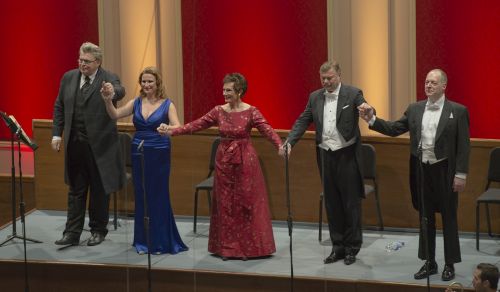 Argentina Wagner, Extracts from Tristan und Isolde: Soloists,Chorus of Teatro Colón, West-Eastern Divan Orchestra. Conductor:Daniel Barenboim, Teatro Colón, Buenos Aires. 6 .8.2014. (JSJ)
Argentina Wagner, Extracts from Tristan und Isolde: Soloists,Chorus of Teatro Colón, West-Eastern Divan Orchestra. Conductor:Daniel Barenboim, Teatro Colón, Buenos Aires. 6 .8.2014. (JSJ)

Cast:
Tristan: Peter Seiffert
Isolde: Waltraud Meier
Brangäne: Ekaterina Gubanova
King Mark: René Pape
Melot: Gustavo López Manzitti
The infrequent return of Daniel Barenboim to his homeland is always a high point in the Argentine arts calendar and the latest is of particular note. With the West-Eastern Divan Orchestra, which Barenboim established with Edward Said, he is presenting a ‘Festival of Music and Reflection’ extending over the three years 2014/15/16. The current programme includes several (reportedly outstanding) concerts with Martha Argerich – a first that they perform together locally – a concert with the Argentine musical-comedy group Les Luthiers, a programme for Mozarteum Argentino, and a free public concert in the outskirts of the city.
The other work, the subject of this commentary, is a (regrettably) reduced concert version of Tristan und Isolde, comprising the Prelude, Act 2 (without Kurwenal), and the Liebestod – a little under half in terms of timing.
And with it a stellar Wagnerian cast, including Waltraud Meier, whom longtime local opera goers remember from her 1981 Fricka, and making their local debuts Peter Seiffert and René Pape.
Scoreless, Barenboim showed his mastery of the work, with his tempi and attention to every detail, and the orchestra completely responsive and flawless. Before the Liebestod he insisted on complete silence before starting but although indicating, was unsuccessful in halting the applause before the last note had completely died away.
Among the singers the undisputed highlight was Pape – a truly noble King Mark, whose sense of betrayal by Tristan was palpable, his singing marked by clarity and expression. But neither Seiffert nor Meier were far behind in terms of intensity and phrasing, most notably in the long duet ‘O sink hernieder, Nacht der Liebe’ and in the final ‘Mild und leise wie er lächelt’.
The young Russian soprano Ekaterina Gubanova brought color and good projection to Brangäne, and Gustavo López Manzitti was a solid Melot.
Next year’s programme has yet to be announced but there is no doubt it will be as eagerly awaited as was this first year’s, with a maestro whose energy appears almost boundless.
Jonathan Spencer Jones